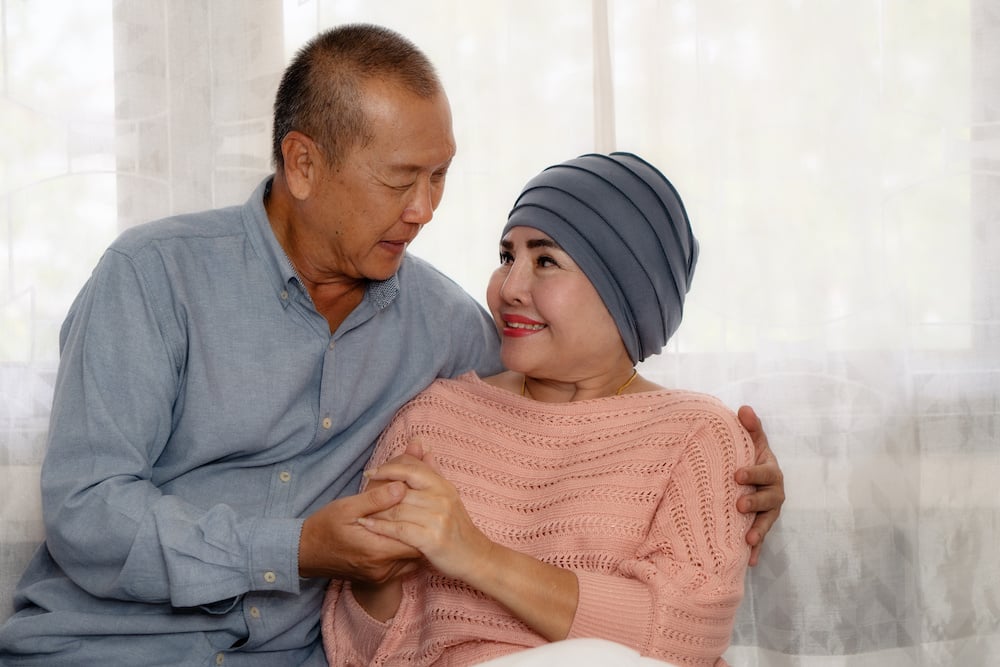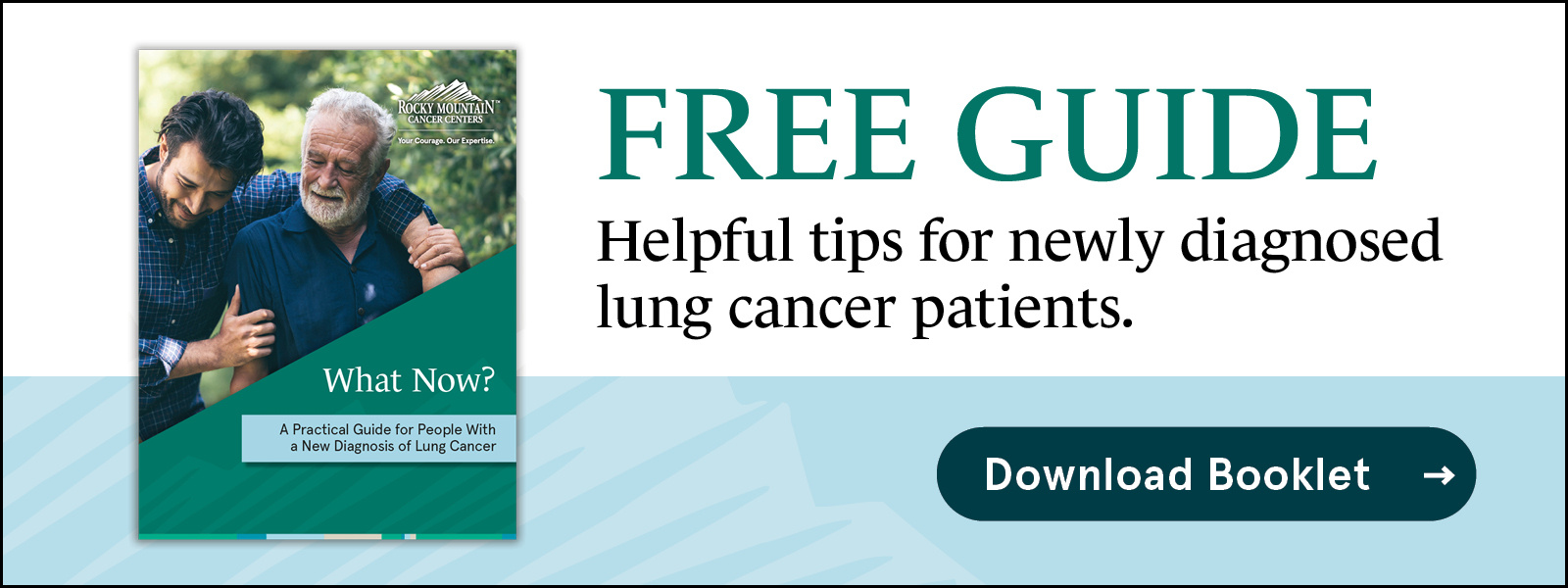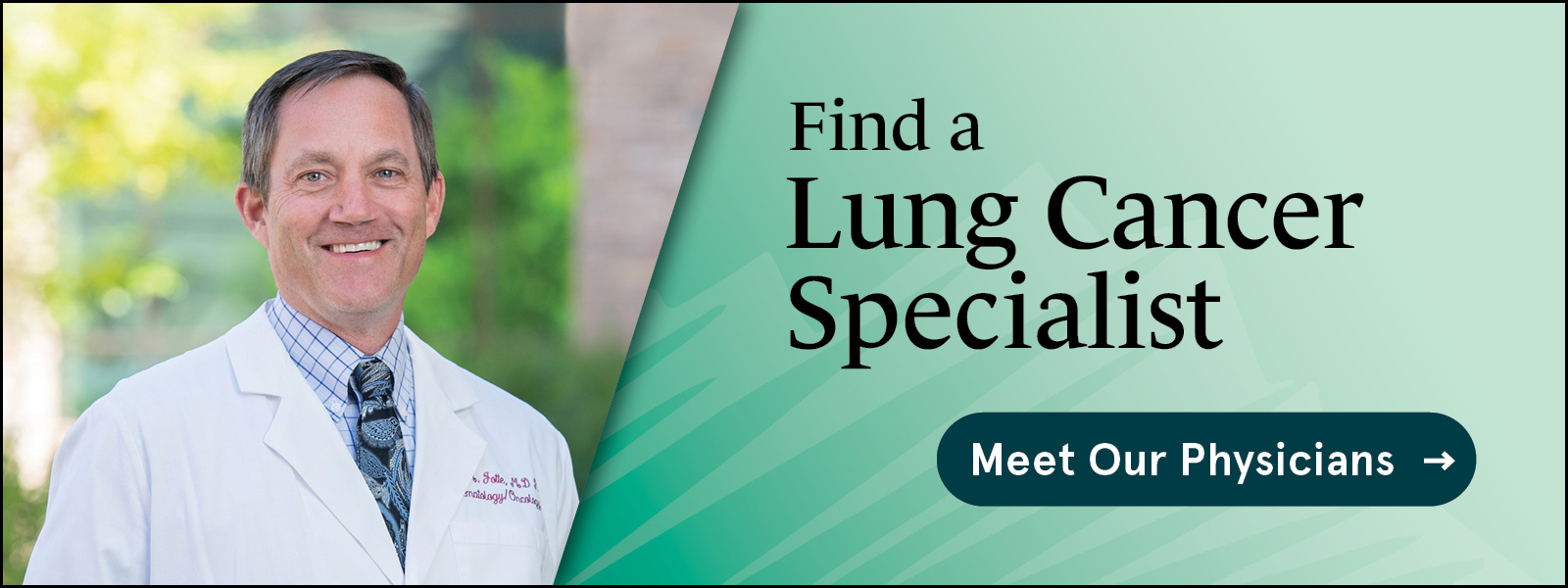What You Should Know About Lung Cancer Treatment Side Effects
8 min read

One of the first questions most patients have after a lung cancer diagnosis is, “What are the side effects of treatment?” It’s normal to have concerns about what to expect, especially if you’ve just had a tumor removed from your lung and you’re managing the effects of surgery. Your cancer care team will guide you through what you might expect and the best ways to prevent and manage as many of the side effects of treatment as possible.
Lung Cancer Treatment Side Effects Look Different for Each Patient
Most patients with lung cancer receive a combination of multiple treatments to remove the cancer and kill any remaining lung cancer cells in the body. This is referred to as a personalized treatment plan because it’s specific to the type and stage of lung cancer, and in some cases, the treatments are also specific to genetic mutations found in the cancer cells.
While there are common side effects, everyone’s reactions will be a bit different based on the therapies used and the timing of the treatments. Sometimes, side effects don’t appear until after several treatment sessions. These side effects tend to worsen throughout treatment but begin to go away about two to three weeks after the treatment ends. Some lung cancer survivors experience long-term treatment side effects that you may notice for a few months or more after treatment. Be sure you discuss all side effects with your oncologist.
Common Lung Cancer Treatment Side Effects and Tips on How to Cope With Them
While expected, there are some ways to manage the side effects experienced by most patients during lung cancer treatment.
Fatigue and Weakness
Fatigue is more than feeling tired. It’s a feeling of exhaustion that a nap won’t fix. It’s the result of several different types of cancer treatments, including radiation therapy, chemotherapy, and targeted therapy.
Try to rest more often. Sit or lie down several times a day. Eat nutritious foods that can give you strength and energy. You can also try some light exercise. That may sound odd, but it can reduce fatigue. Also, don’t forget to try new energy-saving approaches, like online shopping/delivery instead of going to the store. Get help from family, friends, or a paid caregiving service.
Pain and Soreness
There are several reasons patients experience pain during lung cancer treatment. It can be related to surgery. It can take several weeks or months to recover from it, and you may need pain medications. Give your body time to rest and heal.
Radiation therapy may also result in pain, irritation, or soreness at the site where radiation is delivered. Be gentle with your skin, even if it’s not looking red or peeling like sunburn. Avoid talcum powder because it can contain tiny metal particles that aggravate the soreness. Gently pat dry after washing. Don’t rub the area; keep it free from irritants like perfume, deodorant, shaving, hair removal treatments, or a heating pad.
Infection and Bleeding
Some lung cancer treatments can make you more susceptible to infections and bleeding. Here are some precautions you can take to reduce your likelihood of an infection:
- Wash your hands regularly.
- Avoid raw or undercooked foods.
- Stay away from crowds or sick people.
- Keep your mouth clean by brushing with a soft toothbrush and gargling with a mixture of baking soda and warm water.
- Minimize the risk of cuts by using an electric shaver rather than a razor.
You should also avoid cuts while going through cancer treatment because they can become infected more easily than usual. Here are some tips for lowering your likelihood of cuts:
- Do not walk barefoot.
- Use only an electric razor during treatment.
- File nails with an emery board rather than cutting them.
- Avoid pulling hangnails.
Keep in mind that some infections can be life-threatening. If you have a fever over 100 degrees, call your oncologist so they can determine the best next steps.
Nervous System Problems
Chemotherapy, specifically, is known to affect the nervous system in a couple of different ways. Some patients experience peripheral neuropathy, which can cause pain, burning, tingling, weakness, or numbness in the hands and feet. Here are some helpful tips if you experience this side effect:
- Be careful when grabbing something hot or very cold because you may not be able to feel the temperature of the surface you’re touching.
- Use handrails to steady yourself when going up or down stairs since the feeling in your feet may cause you to be off balance.
- Wear close-toed shoes without a heel, even around the house. You can bump your foot and cut it without realizing it when your feet feel numb.
- Stand up slowly so you can be sure you have your balance before you start walking.
- Consider scheduling regular massages, as this could help improve circulation to your foot and hands.
Another condition that occurs due to the treatments affecting your nervous system is called “chemo brain.” This is a type of brain fog that can lead to forgetfulness and problems concentrating or finding your words. Make lists, take notes during appointments, and work on brain puzzles or crosswords to stay mentally sharp. While it does go away for most patients after treatment, chemo brain is one of the side effects that may take a little longer to clear up.
Skin Reactions
Redness, skin darkening, rash, dryness, scaling, pain, and peeling can occur during radiation therapy, especially in the treatment area and on the other side of your body where the radiation beams leave your body. It might feel like a sunburn. Before treatment, try to keep your skin moisturized. You can use aloe or a scentless cream to help your skin feel better. When outside, protect yourself from the sun.
Targeted therapy and immunotherapy are also sometimes related to skin rashes. Avoid scratching a rash, and talk to the oncology team about how to best manage the rash.
Sore Throat and Mouth Sores
Depending on the treatment type, some patients may experience difficulty swallowing, dry mouth, and/or mouth sores. There are several things you can do to reduce your discomfort:
- Eat soft, moist foods.
- Suck on hard candy, popsicles, or ice chips as needed.
- Avoid foods that are spicy, greasy, or sharp.
- Drink beverages at room temperature.
- Eat slowly.
- Avoid eating three to four hours before bedtime.
- Gently brush teeth after meals with a soft-bristle toothbrush.
- Keep your mouth and lips moist. This can be done with a gentle, alcohol-free mouthwash or a saltwater rinse.
Hair Loss
Hair loss is common while going through chemotherapy for lung cancer. Consider cutting your hair as short as possible at the start of treatment. This is often easier than experiencing longer hair falling out. While you still have hair, use gentle shampoos and a soft brush. Avoid overheating your head because it can cause hair to fall out faster.
If you have very short hair or no hair, be sure you have hats, scarves, or a wig available to keep your head covered, especially during the colder Colorado months.
Gastrointestinal Issues
Nausea is a common side effect of cancer treatment. Sometimes, it may be accompanied by vomiting. Talk to the infusion room nurse about how you’re feeling. They may even add an anti-nausea medicine to the bag of medicine that you receive. There are also anti-nausea drugs you can take at home.
Patients might also experience diarrhea and constipation. Report diarrhea that lasts more than a day to your care team, as it can quickly lead to dehydration. Constipation can increase the risk of developing hemorrhoids or other problems. To manage this, increase the fiber in your diet, drink plenty of fluids, and try to add some light exercise to your routine.
Depression or Anxiety
Depression or anxiety are common. If you have thoughts of suicide, call your cancer care team immediately. There are some ways you can help reduce symptoms of depression and anxiety.
- Try to exercise regularly. Even a short 15-minute walk can boost your mood.
- Practice deep breathing and relaxation techniques to help calm your mind and body.
- Use spiritual support, such as meditation or prayer, if this is an important aspect of your life.
- Talk to the supportive care team at the cancer center. They can recommend a mental health professional you can talk to who is familiar with the challenges experienced by cancer patients.
- Spend time with family and friends. This can boost your mood and help you engage with loved ones.
Medication may also be an option. Your oncologist can discuss this with you to see which approach may be best.
Long-Term Side Effects of Lung Cancer Treatments
While most side effects go away after treatment, some can continue or start months or years after treatment ends. Most patients don’t experience all of these. Long-term effects can include:
- Lowered cognitive function, also called chemo brain, can last longer than some of the other side effects, or it can appear months after treatment is complete. This can cause difficulty with concentration. An occupational therapist may be able to help by identifying specific challenges caused by chemo brain. They can help you overcome side effects quicker by recommending various mental exercises known to help improve cognitive function. They can also help devise strategies to improve the patient's planning, organizing, and multitasking.
- Neuropathy can last in some patients depending on the lung cancer chemotherapy drugs used. This can feel like your hands and feet are “asleep.” Be careful when standing up that you have your balance before beginning to walk when your feet feel numb.
- Shortness of breath and cough occur in about 4% of patients who undergo chest radiation. If you notice any changes in your breathing or cough up a lot of mucus, it's essential to report it to your care team. Medications, such as steroids, can help relieve breathing difficulties.
- Narrowing of your throat and esophagus, although rare, can be treated with a procedure that widens the esophagus, making it easier to swallow.
- Inflammation of the heart lining can cause sudden chest pain or tightness, requiring medical attention.
- Anemia is another common side effect of chemotherapy or radiation treatments, which can make you feel tired and weak. The condition occurs when you don't have enough red blood cells to transport oxygen throughout your body. Fortunately, medications and blood transfusions can cure anemia. Additionally, your red blood cells will likely replenish over time after treatments. The amount of time this takes can vary.
- Tooth decay can develop after treatment due to dry mouth, especially if radiation was used in the head and neck area, affecting your mouth’s ability to make saliva. Visit your dentist before treatment begins to care for any cavities or other issues that could worsen during and after treatment.
Lung Cancer Treatment in Colorado
The lung cancer specialists at Rocky Mountain Cancer Centers create personalized treatment plans that include medical oncology, radiation oncology, and surgery. Our team is also here to help with managing side effects. They will guide you through ways to relieve or manage side effects during and after treatment.
If you or a loved one was recently diagnosed with lung cancer, you can schedule a consultation with one of our lung cancer doctors located throughout the Front Range, including the Denver area, Colorado Springs, and Boulder. They are also available to provide a second opinion on a diagnosis and treatment plan.

